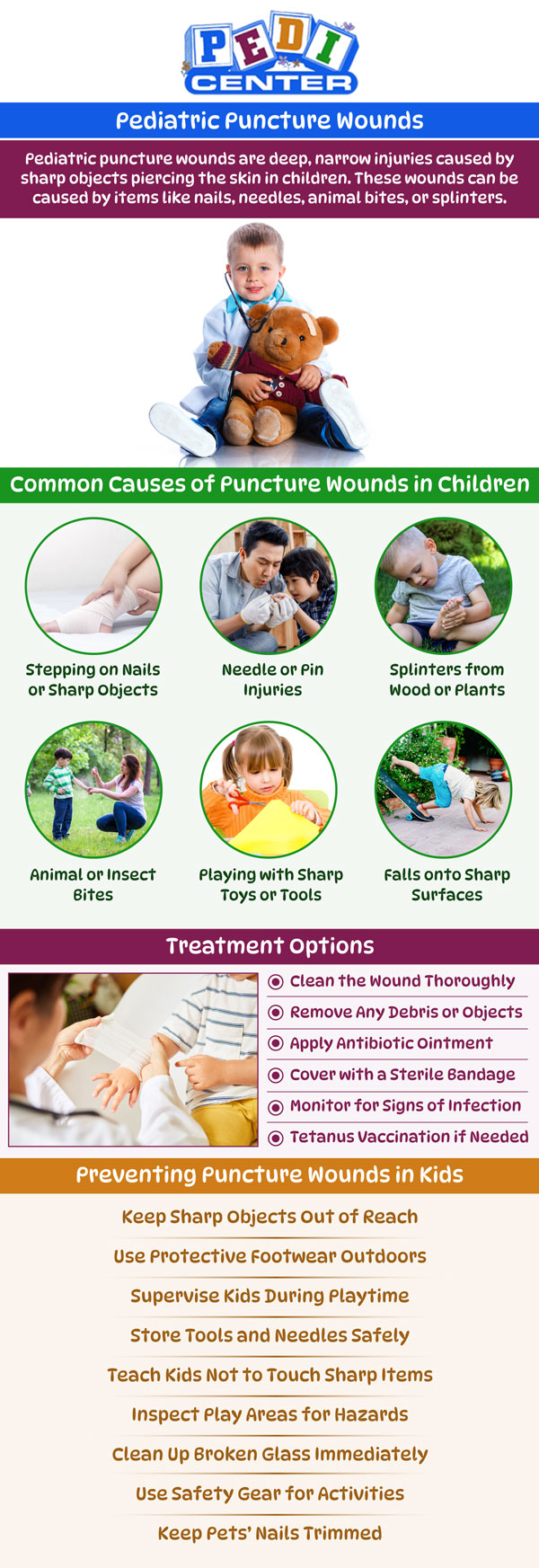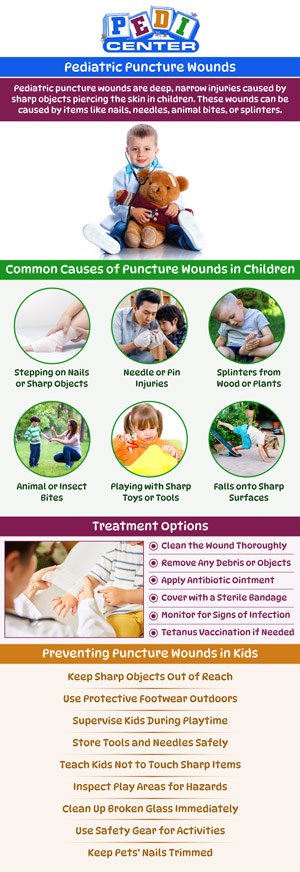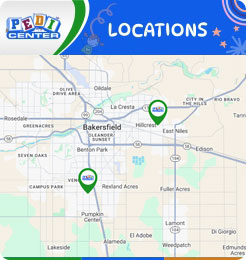Pediatric Puncture Wounds Treatment in Bakersfield, CA
At Pedi Center Urgent Care, we offer attentive and timely care for pediatric puncture wounds to prevent infection and promote healing. Our skilled medical team carefully cleans and evaluates each wound, ensuring any debris is removed and proper treatment is administered. We also provide guidance on aftercare and follow-up to help your child recover safely and comfortably. For more information, contact us or schedule an appointment online. We are conveniently located at Niles Street, and Wible Road in Bakersfield, CA.




Table of Contents:
What should I do if my child has a puncture wound?
Can puncture wounds cause infections in children?
How are puncture wounds treated at a medical facility?
How long does it take for a puncture wound to heal in children?
Prompt and Gentle Care for Pediatric Puncture Wounds at Pedi Center Urgent Care
If your child experiences a puncture wound, it’s important to stay calm and take the right steps to ensure their safety. At Pedi Center Urgent Care, we specialize in treating children and are here to provide immediate, expert care when you need it most.
First Steps at Home:
• Wash your hands thoroughly before touching your child’s wound to help prevent infection.
• If the object that caused the puncture is still embedded, do not attempt to remove it yourself. Bring your child to Pedi Center Urgent Care right away for professional evaluation and safe removal.
• If the object is no longer present, gently rinse the wound with clean water to remove dirt and debris. Avoid scrubbing the wound.
• Apply gentle pressure with a clean cloth or sterile bandage to stop any bleeding. Once the bleeding has stopped, cover the wound with a fresh bandage.
Monitor for Signs of Infection: Watch your child closely for symptoms such as redness, swelling, warmth, pus, or increased pain around the wound. Fever or red streaks spreading from the site may indicate a serious infection. If you notice any of these symptoms, contact us immediately for treatment.
Even minor-looking puncture wounds can be deeper than they appear and may carry a higher risk for infection, including tetanus. Be sure your child’s tetanus vaccination is current. If you are unsure, our providers can advise you and provide a booster if needed.
The pediatric specialists are ready to help your child heal safely and quickly. Our team will thoroughly assess the injury, provide necessary treatment, and offer follow-up care instructions to ensure the best possible outcome.
Puncture wounds are a common injury in children, often caused by stepping on sharp objects like nails or splinters, or by animal bites. Unlike surface cuts, puncture wounds have small openings but can be quite deep, making them harder to clean and more likely to become infected.
We frequently treat children with puncture wounds. Our pediatric specialists know that children may not always report minor injuries right away, and their developing immune systems can make them more susceptible to infection. Signs of infection to watch for include redness, swelling, warmth, pain, pus, or red streaks near the wound. If left untreated, infections can quickly worsen and lead to complications such as cellulitis, abscesses, or even more serious systemic infections.
Certain bacteria, like Staphylococcus aureus and Streptococcus species, are often responsible for these infections. Animal bites—another common cause of puncture wounds in children—can introduce additional harmful bacteria. If the wound was caused by a dirty object, there’s also a risk of tetanus, especially if your child’s vaccinations are not current.
If your child experiences a deep puncture wound, a wound caused by an animal bite, or any signs of infection, it’s important to seek prompt medical attention. Our team can thoroughly clean the wound, assess the risk of infection, provide antibiotics if needed, and update your child’s tetanus immunization if necessary.
When your child arrives at Pedi Center Urgent Care with a puncture wound, our pediatric healthcare team begins with a thorough assessment tailored specifically for young patients. We evaluate the depth and location of the wound, check for signs of contamination, and look for any foreign objects or potential injuries to underlying structures such as tendons, nerves, or blood vessels—always with your child’s safety and comfort as our top priorities. We also review your child’s tetanus immunization status, since puncture wounds can increase the risk for tetanus infection.
After the initial evaluation, our providers carefully clean the wound using sterile solutions to flush out any dirt, bacteria, or foreign material. If needed, we may gently remove debris with special tools, and local anesthesia can be used to minimize discomfort and anxiety for your child.
Once the wound is clean, we check for signs of infection or any foreign bodies that might be hiding beneath the surface. If the puncture is deep or especially concerning, we may recommend an X-ray or other imaging to ensure there is nothing left inside the wound. Most pediatric puncture wounds are not closed with stitches, as this can increase the risk of infection. Instead, we typically leave the wound open to heal naturally, sometimes applying a sterile dressing to keep it protected.
If the wound is deep, dirty, or located in a high-risk area, or if your child has a condition that affects the immune system, we may prescribe antibiotics as a precaution. If your child’s tetanus vaccination is out of date or unknown, we will provide a booster or immunoglobulin to keep them safe.
At Pedi Center Urgent Care, we understand that children are naturally curious and active, which sometimes leads to accidents like puncture wounds. The healing time for a puncture wound in children can vary based on the wound’s size, depth, location, your child’s overall health, and how the wound is cared for.
Minor puncture wounds often start to heal within a few days, with noticeable improvement in about five to seven days.
Deeper or larger wounds may take up to two weeks or longer to heal completely.
It’s important to monitor your child’s wound for signs of infection, such as:
• Increased redness or swelling
• Warmth around the area
• Pus or unusual drainage
• Persistent or worsening pain
If you notice any of these symptoms, or if the wound was caused by a rusty or dirty object, visit us promptly. Our pediatric specialists can assess the injury, clean the wound, and provide any necessary treatment, including updating your child’s tetanus vaccination if needed.
Our team will guide you on proper wound care, including cleaning the area, keeping it covered, and monitoring for signs of infection. We’re here to answer your questions and ensure your child’s wound heals safely and quickly.
At Pedi Center Urgent Care, we prioritize quick, safe, and child-friendly treatment for puncture wounds. Our experienced team focuses on pain relief, wound cleaning, and infection prevention while ensuring your child feels calm and supported throughout the visit. If your child experiences a puncture wound or you have concerns about their recovery, don’t hesitate to contact or visit us—your partner in pediatric health. For more information, contact us or schedule an appointment online. We are conveniently located at Niles Street, and Wible Road in Bakersfield, CA. We serve patients from Bakersfield CA, Maltha CA, Kayandee CA, Rosedale CA, Oildale CA, Lamont CA, and surrounding areas.
Check Out Our 5 Star Reviews



Additional Services You May Need
▸ Well-Child Visits
▸ School & Sports Physicals
▸ Immunizations
▸ Sick Visits
▸ Insect Stings
▸ Snake Bites
▸ Eye Trauma
▸ Poisons
▸ Nosebleeds
▸ Lyme Disease
▸ Animal Bites
▸ Spider Bites
▸ All Services





